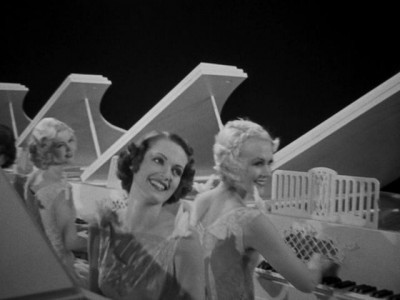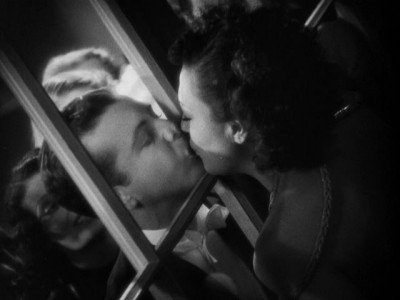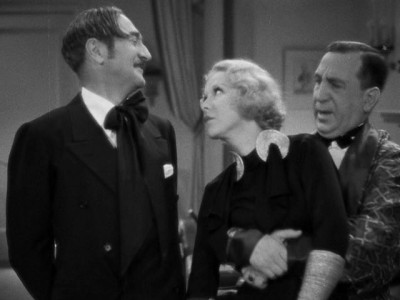
With Warner Bros.’ inevitable follow-up to Gold Diggers of 1933, production-number specialist Busby Berkeley found himself promoted to full director status. And if the resulting Gold Diggers of 1935 wasn’t quite up to its predecessor or other films in which Berkeley only contributed the musical numbers, it’s probably less his fault than the fault of the newly enforced Production Code. The risqué dialogue and cheerfully promiscuous, wisecracking chorus girls were out bounds and so were those traveling shots between the girls’ legs. What was left is pretty much what Berkeley managed to get onscreen — and, on its own merits, it’s a lot better than is often assumed. Berkeley starts off strong — teasing us with the suggestion that the entire film might be in his signature scene. The opening with the staff getting the posh Hotel Wentworth for the summer season is delightful with its choreographer janitors, gardeners, maids, etc. It’s almost a small parody of Berkeley’s production number style, but it’s not something the film can maintain. Still, there are delights along the way.

The “gold diggers” this round aren’t chorus girls, but a gang of opportunistic characters working in cahoots with hotel manager Grant Mitchell (“I’m the fellow who gets 25 percent of everything anybody gets”) in an effort to fleece a tightwad widow (Alice Brady) out of as much of her sizable fortune as possible while producing a charity show. At the head of this constantly bickering gang is Adolphe Menjou as down-at-the-heels (we first meet him pocketing sugar cubes, claiming they’re for his horse) theatrical director Nicolai Nicoleff — an outrageous parody of Max Reinhardt, who WB had just hired to create its fabulously expensive version of A Midsummer Night’s Dream. (Nicoleff claims he once produced that particular Shakespeare play “with an all-Eskimo cast,” which probably isn’t much screwier than the studio’s all movie star cast.) Also along for the ride is venal stenographer Glenda Farrell (in search of a breach of promise suit) and scenery designer Joseph Cawthorn. When this lot is onscreen, the film not only zips along, but so does Berkeley’s direction.

Unfortunately, there’s also a dopey romance between Dick Powell and Gloria Stuart. Most of you know her as Old Rose in Titanic. She had fared well at Universal when showcased by James Whale. Here, she’s saddled with a thankless role — and it doesn’t help that she neither sings nor dances. But there are still those Berkeley production numbers to smooth things over — including one of his best (some would call it his very best). This is the “Lullaby of Broadway,” which tells the story of a “Broadway Baby” (Wini Shaw) as an extended dream sequence — a nightmare, really, with its Expressionist lighting and riot of Dutch angles. The film would be worth seeing for this alone, but there is more to appreciate than just that.
The Asheville Film Society will screen Gold Diggers of 1935 Tuesday, July 16, at 8 p.m. in the Cinema Lounge of The Carolina Asheville and will be hosted by Xpress movie critics Ken Hanke and Justin Souther.




Also along for the ride is venal stenographer
Not a character type you see enough of these days.
In movies or in real life?